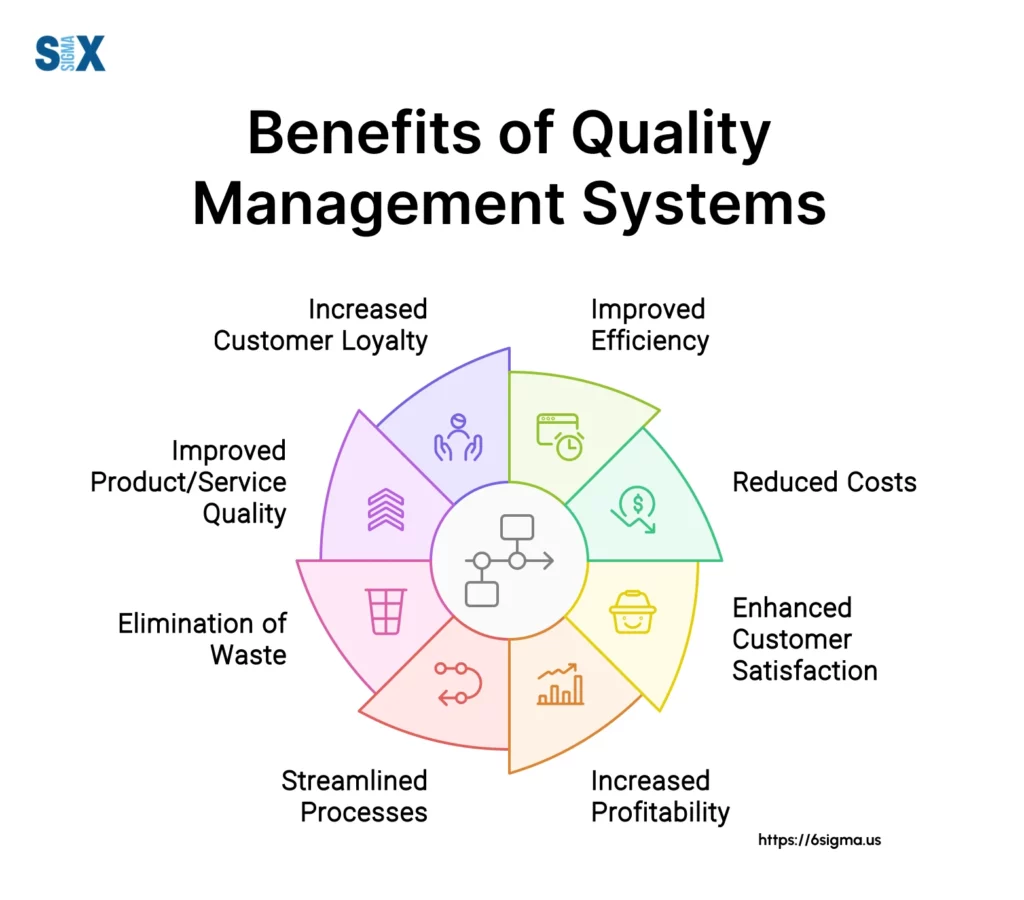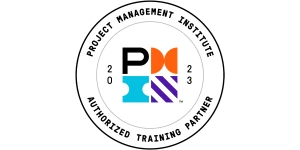6 Key Benefits of Quality Management Systems | QMS Guide
A QMS is a formalized system that documents processes, procedures, and responsibilities for achieving quality policies and objectives.
It helps coordinate and direct an organization’s activities to meet customer and regulatory requirements and improve its effectiveness and efficiency on a continuous basis.
Key Highlights
- Enhanced operational efficiency and cost reduction
- Improved customer satisfaction and retention rates
- Ensured regulatory compliance and risk mitigation
- Fostered culture of continuous improvement
- Boosted overall business performance and profitability
- Streamlined processes for ISO 9001 certification
- Facilitated data-driven decision-making across organization
Introduction to Quality Management Systems
A robust QMS is not just a nice-to-have; it’s a critical tool for organizations striving for excellence and sustainable growth.

Key components of a QMS
QMS comprises several key components.
These include quality policies and objectives, a quality manual, documented procedures, work instructions, and records.
The system also encompasses quality planning, quality assurance, quality control, and quality improvement mechanisms.
These components work in tandem to create a comprehensive framework that guides an organization towards achieving its quality goals.
Enhancing Operational Excellence with Benefits of a Quality Management System (QMS)
QMS can revolutionize operational efficiency.
It drives process improvement, increases efficiency, and reduces costs through waste elimination.
Process improvement and standardization
One of the primary benefits of a quality management system is its focus on process improvement and standardization.
QMS implementation leads to the identification and elimination of inefficiencies in business processes.
By documenting and standardizing procedures, organizations can ensure consistency in their operations, reduce variability, and minimize the likelihood of errors.
Increased operational efficiency with the Benefits of a Quality Management System (QMS)
A well-implemented QMS significantly boosts operational efficiency.
It provides a structured approach to identifying bottlenecks, streamlining workflows, and optimizing resource allocation.
QMS tools like statistical process control and business process charting can lead to substantial improvements in cycle times and overall productivity.
Cost reduction through waste elimination
Another crucial benefit of a QMS is its ability to drive cost reduction through waste elimination.
By applying Six Sigma methodologies within the QMS framework, organizations can identify and eliminate various forms of waste – be it overproduction, unnecessary inventory, or excessive motion in manufacturing processes.
This not only reduces operational costs but also enhances the organization’s bottom line.
Driving Customer Satisfaction and Retention
Customer satisfaction is the lifeblood of any successful business, and a QMS plays a crucial role in achieving it.
QMS ensures consistent quality, meets customer expectations, and improves communication channels.
Consistent product quality with the Benefits of a Quality Management System (QMS)
A QMS plays a pivotal role in ensuring consistent product quality. Through my work with companies like Motorola and HP, QMS can significantly reduce product defects and variations.
This consistency not only meets but often exceeds customer expectations, leading to increased satisfaction and loyalty.
Meeting customer expectations
By focusing on customer requirements and feedback, a QMS helps organizations align their processes and outputs with customer expectations.
The voice of the customer becomes an integral part of the quality management process, ensuring that products and services are designed and delivered to meet specific customer needs.
Improved customer communication and feedback
A QMS also facilitates better communication with customers. It provides structured mechanisms for gathering, analyzing, and acting on customer feedback.
This continuous loop of communication and improvement not only enhances customer satisfaction but also builds long-term relationships, leading to higher customer retention rates.
Ensuring Compliance and Risk Management
Compliance and risk management are more critical than ever.
QMS helps meet regulatory requirements, facilitates ISO 9001 certification, and mitigates risks effectively.
Meeting regulatory requirements
QMS is invaluable for ensuring compliance. Through my experience working with government institutions like NATA and the US Army.
QMS can help organizations navigate and meet various regulatory requirements efficiently.
ISO 9001 certification benefits
Achieving ISO 9001 certification is often a key goal for many organizations implementing a QMS.
The benefits of this certification are numerous – from increased credibility in the market to improved operational efficiency.
Moreover, the process of obtaining and maintaining ISO 9001 certification itself drives continuous improvement within the organization.
Effective risk assessment and mitigation with the Benefits of a Quality Management System (QMS)
A QMS provides a framework for systematic risk assessment and mitigation.
Through tools like Failure Mode and Effects Analysis (FMEA) and risk matrices, organizations can proactively identify potential issues and develop strategies to address them before they become problematic.
Fostering a Culture of Continuous Improvement
A QMS is not just about processes; it’s about people and culture.
QMS fosters employee engagement, promotes data-driven decision-making, and implements effective CAPA strategies.
Employee engagement and training
A successful QMS relies heavily on employee engagement.
This not only improves the effectiveness of the QMS but also boosts employee morale and productivity.
Data-driven decision-making
One of the core principles of a QMS is the emphasis on data-driven decision-making.
By using statistical tools and methodologies, organizations can make more informed decisions based on concrete evidence rather than gut feeling or assumption.
This approach leads to more effective problem-solving and process improvement.
CAPA implementation as Benefits of a Quality Management System (QMS)
Corrective and Preventive Action (CAPA) is a crucial component of any QMS.
It provides a structured approach to addressing non-conformities and preventing their recurrence.
CAPA implementation can lead to significant improvements in product quality and process efficiency.
Boosting Business Performance with the Benefits of a Quality Management System (QMS)
The ultimate goal of any business initiative is to improve overall performance, and a QMS delivers on this front.
QMS increases productivity and profitability, provides a competitive edge, and opens doors to new market opportunities.
Increased productivity and profitability
The culmination of all the benefits mentioned above – improved processes, reduced waste, higher quality, and better customer satisfaction – inevitably leads to increased productivity and profitability.
Organizations with a well-implemented QMS often see substantial improvements in their financial performance.
Competitive advantage in the market
QMS can provide a significant edge. It demonstrates an organization’s commitment to quality and customer satisfaction, which can be a key differentiator in the market.
Opportunities for market expansion with the Benefits of a Quality Management System (QMS)
A QMS can also open doors for market expansion. Many organizations, especially in highly regulated industries, require their suppliers to have certified quality management systems.
By implementing a QMS and achieving certifications like ISO 9001, organizations can qualify for new business opportunities and expand into new markets.
Implementing a Successful QMS
Implementing a QMS is a journey that requires careful planning and execution.
These are the key steps, common challenges, and essential metrics for measuring QMS effectiveness.
Key steps in QMS implementation
Implementing a QMS is a significant undertaking that requires careful planning and execution.
Key steps include gaining management commitment, defining the scope of the QMS, documenting processes, training employees, conducting internal audits, and continually reviewing and improving the system.
Overcoming common challenges with the Benefits of a Quality Management System (QMS)
Common challenges in QMS implementation include resistance to change, lack of resources, and difficulty in maintaining momentum.
Overcoming these challenges requires strong leadership, effective communication, and a clear demonstration of the benefits of a Quality Management System (QMS) to all stakeholders.
Measuring QMS effectiveness through performance metrics
To ensure the continued success of a QMS, it’s crucial to establish and monitor key performance indicators (KPIs).
These might include metrics related to product quality, customer satisfaction, process efficiency, and financial performance.
Regular review of these metrics allows organizations to gauge the effectiveness of their QMS and identify areas for improvement.
The Long-Term Impact of Quality Management Systems
In conclusion, the benefits of a quality management system are far-reaching and impactful.
From improved operational efficiency and customer satisfaction to enhanced compliance and risk management, a well-implemented QMS can transform an organization’s performance across multiple dimensions.
Future trends in quality management
Looking ahead, we can expect to see quality management systems evolving to incorporate emerging technologies like artificial intelligence and machine learning.
These advancements will likely lead to even more sophisticated data analysis capabilities and predictive quality management approaches.
Organizations to embrace the Benefits of a Quality Management System (QMS)
Given the numerous benefits of a Quality Management System (QMS) and the critical role that quality plays in today, organizations of all sizes and across all industries should embrace quality management systems.
A robust QMS is a strategic decision that will pay dividends in the long run.
Remember, in the world of business, quality isn’t just about meeting standards – it’s about exceeding expectations and driving continuous improvement.
SixSigma.us offers both Live Virtual classes as well as Online Self-Paced training. Most option includes access to the same great Master Black Belt instructors that teach our World Class in-person sessions. Sign-up today!
Virtual Classroom Training Programs Self-Paced Online Training Programs






